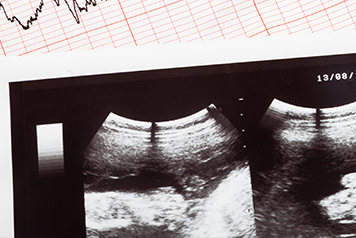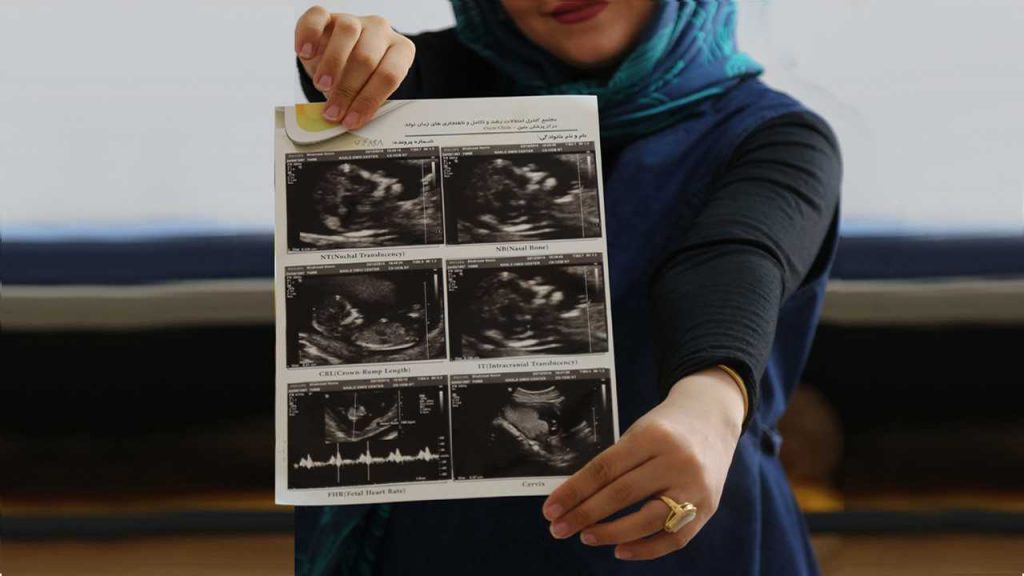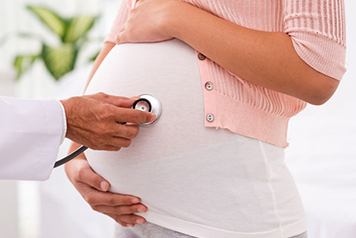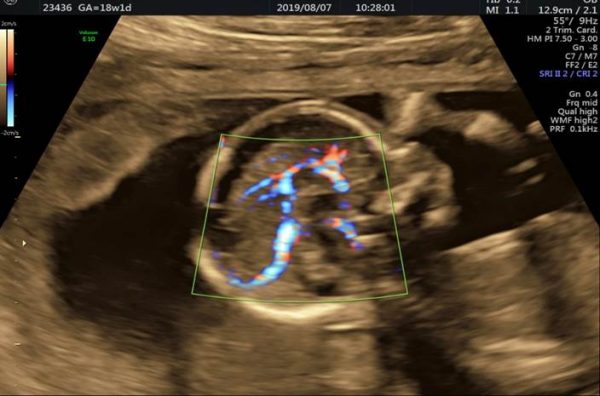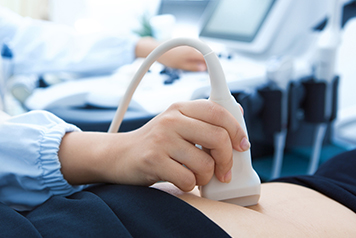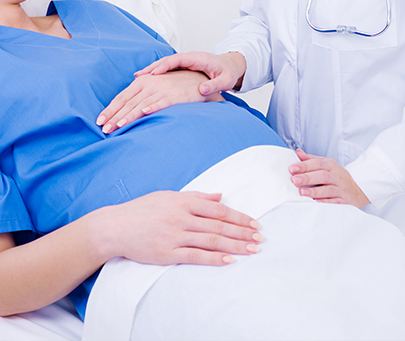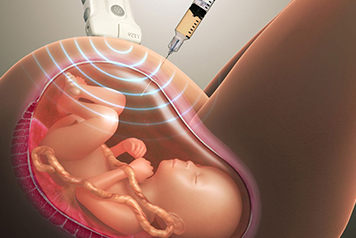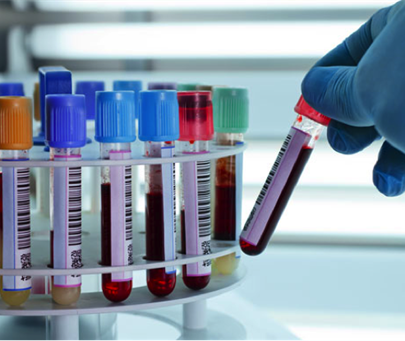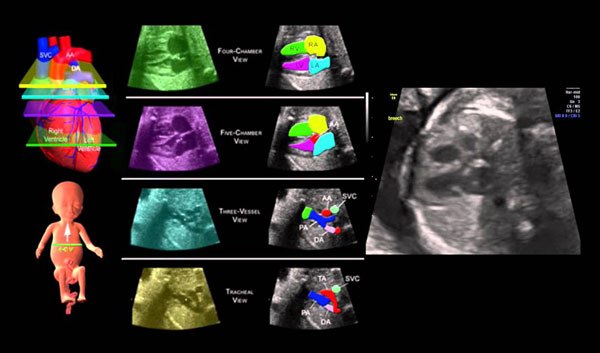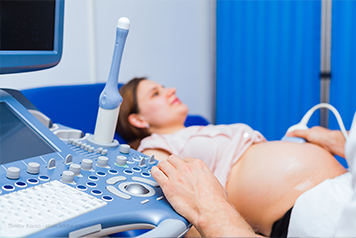Calculation of gestational age
To calculate the gestational age and possible delivery date, enter the date of the first day of your last menstrual period by day, month and year in the box below..
Gestational age
week and dayPossible date of delivery
Fetal condition

first week
In the first week of pregnancy in the menstrual cycle, your body is faced with a complex set of hormones that ultimately leads to ovulation, in which the egg is released from the ovary and ready for fertilization. If you intend to get pregnant, the purpose of the fertilized egg is to be implanted in the uterus for implantation and growth in the next 266 days. In the first week of pregnancy, noticeable changes in your body cannot be understood, and your pregnancy becomes apparent from the third and fourth week of pregnancy when the period falls behind.

second week
In the second week of pregnancy, as you approach the release of the egg from the ovary, you may notice changes in your body. Secret and non-secret changes that by knowing these changes you can guess the day of ovulation. In the second week of pregnancy, symptoms do not appear as quickly, it won't be detected on a home pregnancy test until you have enough pregnancy hormones in your system. This happens in the fourth week when your period has also stopped. At this time, the pregnancy hormone level is high enough to cause pregnancy symptoms.

The third week
In the third week, the blastocyte has chosen its way to the fallopian tube. This trip takes 3 to 7 days. As long as the journey continues, the cells continue to work, ready to implant into the lining of the uterus that has been built over the past week. Once the blastocyst has entered the uterus and attached (positive pregnancy test a few days after implantation), it sends signals to announce its presence. There is still no sign of pregnancy.

fourth week
As the embryo tries to attach itself to the uterine wall, many women experience mild pain in their abdomen during the fourth week. These pains are normal as your body adjusts to the new pregnancy hormones and your uterus becomes the new home of the little embryo. The little embryo inside you is the size of a poppy seed. A small point, about 2 mm. Some women experience bleeding this week, but remember to pay attention to its color. The blood that is expelled from you should not be bright red or bright like during menstruation, but it should be pinkbrownrowr. Implantation bleeding usually occurs 5 days after conception or 12 days after ovulation, which is about day 22 of the cycle. Your pain should not be severe, and if you have severe pain, fever, chills, or heavy vaginal bleeding, be sure to call your doctor. In the fourth week of pregnancy, you are a little bloated, but you still do not look pregnant. However, you need to act like a mother, and that means taking care of yourself and your little one. Over time, your jeans will become tight. So try to use stretch pants, support, loose Anand d thin shirts.

The fifth week
If you did not have any signs of pregnancy last week, you should expect it this week, which is the fifth week of pregnancy. If your breast hurts, you get tired quickly or you have to go to the bathroom constantly, take these symptoms seriously. Your body produces more blood this week to deliver oxygen and food to the baby. The heart rate increases to maintain its balance and this increase brings fatigue, confusion, and headache. This week, breast pain or a tingling sensation will bother you. There is also a possibility of breast enlargement and darkening of the color halo around it. Your baby's heart starts beating this week. The neural folds (tissue folds that become the brain and spinal cord) are connected and this means distinguishing the head from the tail. Also, the embryo is similar to a frog. Your little one is 9mm, the size of a fingernail right now.

sixth week
This week you may feel changes in your breasts, your breasts may be painful to the touch or sensitive to movement. Some women notice an increase in size and changes in the areola (the dark skin surrounding the nipple). The areola may become larger or darker in the sixth week. These are small changes that prepare your breast for breastfeeding. During pregnancy, your sense of smell becomes extremely strong. Your baby's heart is pumping blood through its tiny body this week, and the heart is still a bulge in the front of the body (which eventually moves into the chest cavity). At the end of the sixth week, the upper and lower buds of the organs are also revealed. Your baby's body is developing the inner ear and larynx. The fetus now looks like a tadpole because the back of the fetus is bent and the tail is visible in the fetus. At this stage, the heartbeat of the fetus can be found in the vaginal ultrasound

seventh week
Most women feel something in their womb but cannot describe it. They use words like heavy, stiff, and thick, and experience symptoms like morning sickness, constipation, heartburn, fatigue, and other symptoms. As pregnancy progresses, most women forget the intensity of the first trimester and have a series of vague feelings, including pregnancy forgetfulness. In the seventh week of pregnancy, the belly canrly seen in the mirror. Different women are different, but most of them feel an increase in the size of the uterus in the middle of the second trimester. Your baby's appearance is starting to take shape. They look like aliens with big heads and small bodies because their heads grow faster than the rest of their bodies. This provides a place for their brain to grow rapidly. Cartilage growth begins in the buds of the arm and leg. The arms become longer and straighten at the end. This is a great start for your baby's little hands. The delicate neural network spreads throughout your baby's body. They are intended to initiate small steady movements in the fetus as theithein and spinal cord send signals to the muscles of the fetus's body. Soon your baby will be able to sense sensations such as temperature and taste.

eighth week
This is your second missed period and your first prenatal visit is coming up. This visit will be the longest as history takes time. Your pregnancy symptoms will continue this week. The first trimester of pregnancy will end in less than a few weeks and you will feel better. To prepare the body for birth, a relaxing hormone is produced that softens the joint ligaments. Only 7% of pregnant women have food cravings. In the eighth week of pregnancy, it is normal for the belly to show, but it is also normal not to show it! Because every mother and fetus is different. In the eighth week of pregnancy, the uterus is getting bigger, but in some cases, its ha nges are not well seen. Starting in the second trimester, the doctor will probably start measuring the belly, but for now, the size of the belly doesn't matter. Weight gain in the first trimester is about 0.5 to two kilos per week, so in the eighth week of pregnancy, you may gain or lose more or less weight. Talk to your doctor about your concerns about weight gain or belly size. Your baby weighs one gram and is about 1.6 cm tall.

ninth week
From the beginning of pregnancy to today, hormones have played the most influential role in your both this week, the amount of pregnancy hormone reaches its highest time. Your blood volume continues to increase, peaking in the second trimester and decreasing in the third trimester. You may experience bloating or flatulence at this time, which is completely normal. The fetus starts kicking after 9 weeks, but you won't feel it until 16-22 weeks. Your child begins to swallow fluids and produce digestive juices. At 9 weeks, you are 2 months pregnant. This week you and your child have achieved two great achievements: you have reached the third month of pregnancy and your child is no longer sperm and has become a fetus. It means that your child has become more like a human being. Your baby weighs approximately two grams and is 2.3 tall.

tenth week
The body changes are still going on and you are wasting your time standing in front of the mirror and looking. Try not to buy clothes for yourself at the moment, because you will miss the old clothes and you will have to buy new clothes after your body changes. You will probably gain one or two kilograms in the tenth week, but nausea and other symptoms will make you heavier. To get better, you can do light sports. But consult your doctor before exercising. Walking and swimming are the best sports for this period. If you are active during pregnancy, your muscles will become strong. This will help you carry the increased weight in the 10th week easily, especially in the third trimester of pregnancy. Pregnancy raises your body temperature and makes you more susceptible to dehydration. You need about 79 grams of protein daily to help build your baby's bones, muscles, and skin. Eat eggs, lean meat,t, and milk
Pregnancy symptoms are probably seen in the tenth week of pregnancy. This is because your baby continues to grow rapidly and therefore your belly will start to develop extra curves. Many doctors recommend that women with an average BMI gain about 1 to 2 kilos in the first trimester. If you are pregnant with twins, the doctor recommends that you gain half a kilogram per week during the first half of pregnancy.
Your baby weighs approximately 4 grams and is 1.3 cm tall.
To book an appointment for the screening of the first trimester of pregnancy, contact HopeGene Medical Institute.

eleventh week
In the 11th week of pregnancy, your doctor may prescribe you a screening test for the first trimester of pregnancy at HopeGene Medical Institute, which is a combination of ultrasound and blood test; To determine if your child is at risk for chromosomal abnormalities such as Down syndrome.
At 11 weeks pregnant, your baby is the size of a fig
As you get closer to the end of the first trimester, you will notice changes, especially in your stomach, your breasts are ready to grow and enter your stomach. As you get closer to the end of the first trimester, your symptoms, especially your nausea and vomiting, will improve. Your nausea and vomiting may increase your appetite and increase your weight.
Your baby weighs approximately 7 grams and is 4.1 cm tall.

twelfth week
Be happy, from the twelfth week of pregnancy, the symptoms of pregnancy gradually disappear, especially nausea. Another good news is that the risk of miscarriage will significantly decrease from this week onwards. Also, during this week, the pressure of the uterus on the bladder will probably decrease and the problem of frequent urination will be solved. At the end of the twelfth week, the uterus no longer fits in the pelvis and you can feel it in your lower abdomen. During pregnancy, especially in the first trimester, saliva increases. In the twelfth week of pregnancy, the belly has grown significantly. This is one of the reasons why many mothers start talking to others about pregnancy.
If you haven't done the screening in the first trimester of pregnancy, contact HopeGene Medical Institute before it's too late.
It is usually too early to determine the gender of the fetus and it is not something that the doctor focuses on during the ultrasound. At week 12, the doctor checks to make sure the fetus is healthy, and usually by the week 20 scan, the gender of the fetus is definitive. It is not specified.
Muscle cramps are normal during pregnancy, especially at week 12. Many women feel a sharp pain in one or both sides of the groin while standing or turning. This is normal and is caused by the ligaments that support the uterus. If the cramps are really painful, talk to your doctor.
Your baby weighs 14 grams and is 5.4 cm tall

thirteenth week
From the 13th week of pregnancy onwards, the other pregnancy symptoms are almost improved and may even disappear suddenly from this week onwards so you don't have to worry about it. There is no news of previous bruises. Your uterus can now be easily felt in the lower abdomen. The uterus feels like a round and softball when touched. As nausea and vomiting decrease, you will feel better and the growth of the fetus will increase. Your uterus is now large enough that it is growing and protruding from your pelvis. This means that you start to look like pregnant people. The doctor suggests that you gain a healthy weight; In fact, gain weight slowly.
If you haven't done the first-trimester screening yet, this is your last chance to get pregnant. Contact HopeGene Medical Institute.
- At 13 weeks pregnant, your baby is the size of a pea podHeartburn starts from 6 to 7 months, which is due to the return of stomach acid
- as a result of pregnancy changes.
- Because blood flow increases during pregnancy, sometimes bleeding gums are seen.
- Your baby is the size of a peach, that is, it weighs 23 grams and is 7.4 cm tall.

fourteenth week
The reduction and gradual disappearance of early symptoms of pregnancy such as nausea, fatigue, and chest pain can be seen during this time, you will gain more energy and feel more pleasant about the changes in your body. In some cases, morning sickness continues until the 16th week of pregnancy, and the nipples become dark and the halo around them becomes larger. You may feel a little warm and this is due to the high blood flow in your body. Your body should quickly circulate the blood in the body to supply the oxygen you and your child need.
The fetus can urinate in the amniotic sac in the fourteenth week of pregnancy. He used to drink this water, but now he urinates in it too. Amniotic fluid surrounds your baby and allows it to rotate. He also inhales this liquid as he exhales to prepare himself for breathing. Amniotic fluid regenerates itself every hour.
Your fetus is the size of a lemon, weighs 43 grams, and is 8.7 cm tall.

fifteenth week
In the 15th week of pregnancy, if you experience severe nasal congestion, you can assume it as one of the complications of pregnancy; Because the increase of estrogen hormone may lead to the swelling of the mucous membrane and as a result the production of more mucus. Your blood volume is also increasing, which causes your veins (including nasal veins) to dilate. As a result, you may sometimes get a nosebleed. Just as your child's heart beats fast, your heart also increases in size, the volume of blood it sends to your body, and the number of beats to meet both your needs and the needs of your beloved child, so try not to tire yourself too much. Do not put pressure on your body.
Your doctor may refer you to HopeGene Medical Institute for second-trimester screening this week.
To book an ultrasound appointment for the second trimester of pregnancy or anomaly scan (16 to 22 weeks), contact HopeGene Medical Institute.
In the first trimester, the uterus is well positioned inside the pelvis. But it is being stretched for the growth of the fetus and soon it will raise the pelvis and be placed on top of the abdomen. Every mother's body is different and the growth rate can be slightly different. For this reason, it is completely normal for the belly not to show in the 15th week of pregnancy. If you are 15 weeks pregnant with twins, the belly will probably stretch faster. The recommended weight gain in week 15 is about 0.5 to 1 kg per week, so eat about 300 extra calories per day. If you notice sudden weight gain, tell your doctor right away.
The fetus is more active at this time and returns to its previous activities. At this time, you do not understand the movements of the fetus, but in the following weeks, you will understand the blows of the fetus in the abdomen. The main thing this week is the formation of three bones in the inner ear of the fetus. Be careful of your speech because the fetus will hear your voice from the 15th week onwards. You can call him and talk to him. Sing him a lullaby. He can recognize your lullaby after birth.
Your baby is the size of an orange, weighs 70 grams, and is 10.1 cm tall.
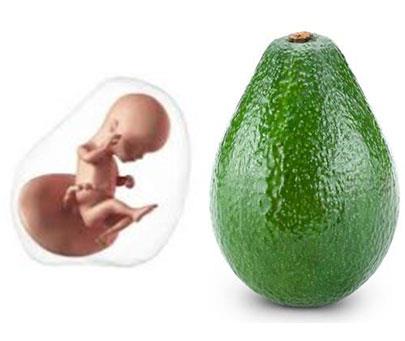
sixteenth week
Very early in the 16th week, you will notice the movements of the fetus in the abdomen. At first, these movements are like gasps or muscle cramps, but over time, as the fetus gets bigger and stronger, the movements become recognizable. These movements are called quaking. You feel movements like tickling, shaking, and sensitivity in your stomach. Of course, if you still haven't felt the movements of the fetus, don't worry and don't think that your fetus is not alive. The feeling of fetal movements starts from 16 to 20 weeks and sometimes it may last until 24 weeks.
Your doctor may refer you to HopeGene Medical Institute for second-trimester screening this week.
To book an ultrasound appointment for the second trimester of pregnancy or anomaly scan (16 to 22 weeks), contact HopeGene Medical Institute.
The time of understanding his movements is different in different women, even in different pregnancies of a woman, this time is different. The activity of the milk-producing gland in the breasts and the increase in blood flow makes you see the veins of the breast. Your breasts are heavy and swollen and your blood flow has increased by about 40-50%.
Your fetus is the size of an avocado and weighs 100 grams and is 11.6 cm long.

seventeenth week
Your entire uterus is changing. Currently, the uterus is located in the pelvis and puts pressure on the intestine. Therefore, it causes movement and displacement of the intestine in the abdomen. The top of the uterus begins to round and its length is increasing. You may start to feel hot as the pregnant body temperature rises to 37 degrees Celsius.
- Your doctor may refer you to HopeGene Medical Institute for second-trimester screening this week.
- To book an ultrasound appointment for the second trimester of pregnancy or anomaly scan (16 to 22 weeks), contact HopeGene Medical Institute.
From this stage, the size of your child is more than a pair. Although the placenta continues to grow. In this week, the brown fat that warms your baby's body after birth begins to form. Also, reflexes such as sucking are being formed. One of the most interesting things about this week is that your baby hears loud sounds outside the womb and starts to move.
The fetus weighs about 140 grams and is the size of your palm.
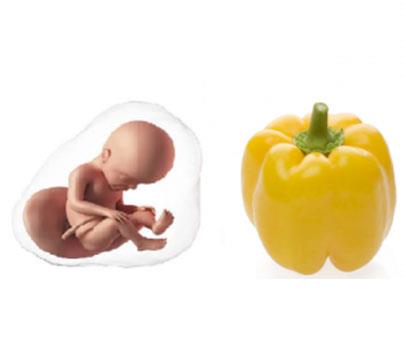
eighteenth week
At this time, your uterus can be felt well below the navel, at the same time as your uterus grows, the balance point in your body changes and this causes your body to become unbalanced. In the 18th week of pregnancy, there is a possibility of dizziness when lying down because the uterus presses on the aorta and other main vessels. Of course, anemia may also make you dizzy. Pregnancy changes the concentration of blood sugar and the rise and fall of blood sugar can lead to feeling confused and weak. In the 18th week of pregnancy, the belly grows rapidly, and tension and pressure cause symptoms. The recommended weight gain in the 18th week of pregnancy is about half to 1 kilo per week for women with an average BMI. If you are concerned about your weight, talk to your doctor. Sudden weight gain or weight loss can be a sign of a problem.
Feeling your baby move is a special part of pregnancy, but it raises many questions – is my baby moving too much or not enough? There is a wide range of what is normal and movements vary from fetus to fetus. Most women feel the first movements between 14 and 26 weeks. What happens if I don't feel the fetal movements at 18 weeks? Don't worry, every fetus is different and if your baby isn't moving this week, it doesn't mean there's a problem. The position of the placenta can affect the amount of movement you feel at this stage – if the placenta is in front, these initial movements will be thwarted and you will have to wait a few more weeks.
Your doctor may refer you to HopeGene Medical Institute for second-trimester screening this week.
To book an ultrasound appointment for the second trimester of pregnancy or anomaly scan (16 to 22 weeks), contact HopeGene Medical Institute.
From now on, the fetus will be more like a human. Prepare yourself to see his face. The closed eyes of the fetus are sensitive to the light falling on your belly. You can see his reaction to the light during the scan. The changes you see in the fetus:
- Fetal face with eyebrows and eyelashes
- The fetal organ is growing and is in harmony with other parts of the fetal body.
- The bones of the fetus are hardened.
- The bones of the inner ear are hardened and the hearing of the fetus is developing.
- The fetus reacts to sounds more than before.
- He can make fists and clap his hands together.
- The connection between nerves and muscles will be established and the movements of the fetus will improve.
- A layer of fat covers the nerves so the nerves can transmit messages from the brain to the body.
- The lungs of the fetus are complete, but oxygen is still transferred to him from the placenta.
- The growth of the fetus is done slowly.
- He can cross his legs, he can bend and shake his arms and legs.
- The fetus kicks every few minutes.
Your fetus is the size of bell pepper and weighs 190 grams and is 14.2 cm tall.

nineteenth week
It would be great if you could enroll in one of the classes related to pregnancy training and birthing exercises at HopeGene Medical Institute; When the delivery time comes, she will see that participating in these classes was worth the time and money.
In the 19th week of pregnancy, the movement of the fetus inside the abdomen becomes noticeable. Of course, this phenomenon happens to some women earlier than others. At the moment, these small movements are more like shocks or vibrations or even gas, but in the next few weeks, the movements will become stronger. This week, the weight gain will be significant, so you will probably gain between 3.5 and 6 kilos. If your weight gain to date is higher or lower than this, talk to your doctor about your concerns. Sudden or rapid weight gain can be a sign of preeclampsia that needs treatment, and lack of weight gain can mean that the fetus is not receiving enough nutrients.
Your doctor may refer you to HopeGene Medical Institute for second-trimester screening this week.
To book an ultrasound appointment for the second trimester of pregnancy or anomaly scan (16 to 22 weeks), contact HopeGene Medical Institute.
Shortness of breath is nothing new. Your bloodstream carries blood to the body and the umbilical cord of the fetus. This makes the body tired. Watch your diet. You need to get enough vitamin C and iron for the growth of the fetus and the health of your body. Try combining different foods to get the nutrients you need. Also, try to eat vegetables during pregnancy. Green leafy vegetables contain nutrients such as fiber, calcium and folate, vitamin C, and iron. Red meat, fresh fruits, lentils, and grains are useful in pregnancy.
From now on, his sense of taste is working in the 19th week. Although other senses such as touch and smell have also been used, he does not have any experience to use his senses at the moment. His nerve cells are working on the five senses of the fetus. His body parts have reached the level of balance and there is no longer a big head and small legs, all of them have grown together.
The height of your fetus this week is approximately 15.3 cm and its weight is about 240 grams.
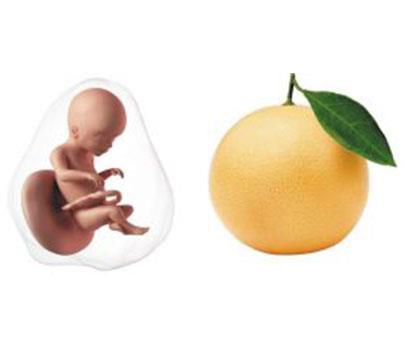
twentieth week
Congratulations! Half of your pregnancy has passed. Now the upper part of the uterus is next to your navel and your weight has probably increased by 4.5 kilograms. From now on, you may gain about half a kilogram of weight every week. To remember and organize a historical pregnancy calendar, you can take professional photos of your pregnancy and frame the sonography image of your baby, which was performed at HopeGene Medical Institute. This week, it has grown so much that it has risen from the pelvis more than before so the compression of the uterus towards the abdomen (chest) is quite evident. Now your pregnancy is clear. From the changes of this week, your navel is stretched or protruded.
The thprotrudedant thing this week is the stretch marks that appear around your navel. After the 20th week of pregnancy, the growth of the uterus will increase by almost one centimeter every week. Over that, the enlargement of the belly has been irregular, but now it is becoming more regular. Starting this week, the doctor will measure the size of the abdomen at each appointment. In the 20th week of pregnancy, this number should be around 18 to 22 cm. The size of the abdomen increases by one centimeter every week. More or less distance is a sign of a pregnancy disease such as gestational diabetes, growth problem, or breech. Therefore, if it does not seem normal, more tests are needed. Pregnancy weight gain for mothers with an average BMI is about 11 to 15.5 kg. If you get pregnant with a high BMI, your doctor will probably recommend a total weight gain of 7 to 11 kg.
If your BMI is low, 12 to 18 kg is recommended. Therefore, if it does not seem normal, more tests are needed. Pregnancy weight gain for mothers with an average BMI is about 11 to 15.5 kg. If you get pregnant with a high BMI, your doctor will probably recommend a total weight gain of 7 to 11 kg. If your BMI is low, 12 to 18 kg is recommended. Therefore, if it does not seem normal, more tests are needed. Pregnancy weight gain for mothers with an average BMI is about 11 to 15.5 kg. If you get pregnant with a high BMI, your doctor will probably recommend a total weight gain of 7 to 11 kg. If your BMI is low, 12 to 18 kg is recommended.
Your doctor may refer you to HopeGene Medical Institute for second-trimester screening this week.
- To book an ultrasound appointment for the second trimester of pregnancy or anomaly scan (16 to 22 weeks), contact HopeGene Medical Institute.
- Her muscles have become stronger in the 20th week of pregnancy and you can easily feel her movements. This week, his skin will be
thicker than before. His height is approximately 16.4 cm and his weight is 300 grams.

twenty-first week
In the 21st week of pregnancy, almost everyone will notice that you are pregnant because your waistline will disappear. As the uterus enlarges, other parts of your body will probably swell in the 21st week of pregnancy. Most women feel better this week because the pressures of early pregnancy are reduced and at this time you can enjoy the life of two people with your partner more. However, pregnancy problems are different for different women and some of you may still have pregnancy problems during these months. In the 21st week of pregnancy, when you wake up, you may feel dull, so spend a few minutes doing stretching exercises to fix this condition.
In the 21st week of pregnancy, you have gained about 5 to 6 kg, and if you are pregnant with twins, you have gained about 9.5 kg. Excess weight makes you feel fat. Remember that gaining weight is good for your health and the health of your baby. Not all weight gain during pregnancy is related to the fetus, but this weight gain is of vital importance.
In the 21st week of pregnancy, the length of your pregnancy has reached half and your child has gained significant weight. This week, your baby will move easily in your mercy. Due to the increase in weight in the 21st week of pregnancy, her movements are felt more, which seems strange in some cases. Previously, the fetal liver and spleen were responsible for producing blood cells, but with the growth of the space between the bone marrow, this organ takes over the responsibility of producing blood cells. Your child now weighs more than the pair and is about 360 grams and his height is 26.7 cm.

twenty-second week
Even though your uterus is growing, bending over, driving, and sitting aren't that difficult to increase the volume of your lungs, your chest expands 2 to 3 inches and returns to its original position after delivery. Now your uterus is a few centimeters above the navel. In the 22nd week of pregnancy, the size of the abdomen is about 20 to 24 cm from the pelvic bone to the top of the uterus.
Your doctor may refer you to HopeGene Medical Institute for second-trimester screening this week.
To book an ultrasound appointment for the second trimester of pregnancy or anomaly scan (16 to 22 weeks), contact HopeGene Medical Institute.
Your doctor will probably tell you to gain weight slowly - about half a kilo or a little more or less a week. To do this, it is recommended to consume an extra 300 calories per day. 300 extra calories don’t mean you have to eat three meals and one or two snacks. You should make changes and eat 5 or 6 small meals throughout the day. In this way, it becomes easier to follow the diet. In addition, by eating smaller and more regular meals, you are less likely to have low energy, heartburn, indigestion, and other problems associated with 22 weeks of pregnancy.
This week, your baby is 27.8 cm tall and weighs 430 grams.
It's hard to believe that your child has grown from two cells to this size. In the 22nd week of pregnancy, your child is practicing the skills he will need after birth, and this practice time is important for your child. Your child is busy with reflexes, breathing, and even sucking. Remember that your child is still growing. He looks like a full human, but he is a little smaller.
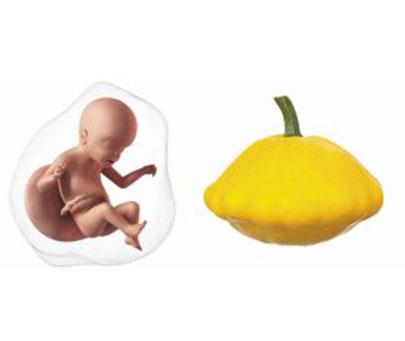
twenty-third week
You are now in the 23rd week of pregnancy, this week you may have some secretions from your breasts and this indicates the preparation of breastfeeding. As your belly expands to make room for the growing baby, you may notice stretch marks on your skin. Some pregnant women do not suffer from this complication, but the effects of this stretch appear on the skin of almost half of them. There are no proven effects of medical solutions and lotions to prevent or eliminate these colored lines. But they can reduce possible itching caused by skin stretching. Also, your indented and beautiful navel may change shape, probably the surface of your navel will be flattened first and will even come out soon; But don't worry, it will most likely return to its normal state after giving birth.
Remember that pregnancy is a different experience for each person and body changes are also different. It is better not to pay attention to the words of others and consult your doctor. Changes in the size and shape of the body happen. Your belly is getting bigger every day. You have gained approximately five to seven kilograms of weight till today. At this time, you notice the movement of your child. Small and regular meals reduce the possibility of energy loss, indigestion, and heartburn.
This week, your fetus is 28.9 cm tall and weighs 501 grams.
Your baby's intestines are filled with a thick substance called meconium, which is your baby's first bowel movement. Normally, it is not seen until delivery and a few days after that. The thin layer of hair on your baby's body is getting darker in the 23rd week of pregnancy. Your child's nails are growing. She will start hiccups, you will feel contractions with each hiccup. His eyes have grown enough, but his iris still lacks its pigments. However, this week his eyes open and he blinks. Your fetus is almost a real baby, from now on its development will develop more and more every day.
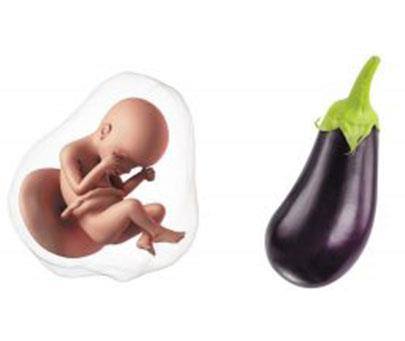
twenty-fourth week
In the twenty-fourth week of pregnancy, your uterus is about 24 cm high from the pubic bone (pubis) to the top of the cervix. Now you can notice your child's movements and understand his sleep and wake cycles. If your belly button is sticking out, don't worry. The swelling of the uterus has pushed it forward and after the navel is born, it returns to normal.
At 24 weeks pregnant, you will notice the baby kicking for a few weeks, but now the kicks are getting stronger and stronger. The recommended pregnancy weight in the 24th week of pregnancy is about 6 to 7 kg. If you gain a little more weight than that, it is not alarming, sudden or sudden weight gain is cause for concern, but for a healthy pregnancy, you need to consider ways to control the weight.
It is recommended that women gain 11 kilos in the 24th week of pregnancy with twins. This weight gain reduces the risk of premature birth.
This week, your baby is 30 cm tall and weighs 600 grams.
This week is very important for you. Your baby's lungs are maturing so he can live outside the womb and he's increasing his brown fat so he can regulate his body temperature at birth. Well, he's supposed to have wrinkles on his palms and knuckles this week. This week, his ears and eyes are in place. He is sleeping in a bent position so that he can fit himself in your womb. Your baby can hear you now, so try talking to him and singing to him. Your baby's face is already fully formed with eyelashes, eyebrows, and hair. Your body produces more mucus during pregnancy, which can lead to nasal congestion, sinusitis, and headaches.
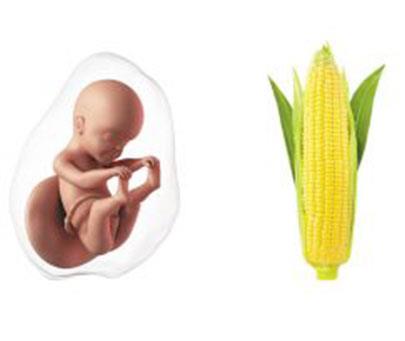
twenty-fifth week
You have probably gained about 7 to 8 kilos so far. If you are pregnant with twins, you will probably gain more than 11 to 18 kg. At 25 weeks of pregnancy, weight gain can be a source of anxiety. Weight gain also occurs slowly and steadily. Part of this weight gain is due to the weight of pregnant women in the middle of pregnancy. If weight gain is a problem, your doctor will let you know. Instead of stressing about weight, focus on what's happening inside your belly at 25 weeks pregnant.
Fetal movements become more noticeable at week 25—and you'll likely notice patterns. When you feel many beats, the fetus is awake, and when there are no beats, it is probably asleep. Regular movement is a sign of a healthy and active fetus. If you haven't felt your baby's movements for a while and want to make sure everything is fine, drink some ice water, and listen to music. This week, your baby is 34.6 cm tall and weighs 660 grams.
This week your child will open his eyes again. His bones continue to harden. From now on, your baby will gain most of its weight. Your baby is still storing fat in his body. His respiratory system is still evolving.

twenty-sixth week
It is normal for the height of the uterus to increase by one centimeter every week during the second half of pregnancy. In weeks 24 to 27, your blood pressure had dropped, and during this period, your blood flow will increase again. During this period, you feel back pain, leg muscle cramps, and pressure on the pelvic area due to carrying a heavy load. But something good also happens in your body, your hair reaches its most beautiful state due to the presence of high estrogen and progesterone in your body. Facts about your baby in the 25th week of pregnancy:
- It is better to plan your birth now; Place of birth, pain reliever, and companions
- Before milk production, in the first few days after birth, your breasts produce a thick, viscous, yellow liquid known as "liquid gold".
- Change your posture to avoid falling on your face (the center of gravity changes during pregnancy).
Changes in your weight this week:
In the 26th week of pregnancy, you will probably gain about 7 to 10 kilos. If you are pregnant with twins, you will gain about 12 to 19 kilos. When you feel your abdomen, you will notice that the top of the uterus is about 2.5 inches above the belly button. During pregnancy, the belly grows about half an inch every week.
To book an ultrasound appointment for the third trimester of pregnancy (28 to 30 weeks), contact HopeGene Medical Institute.
At 26 weeks pregnant, your baby is the size of a beetroot
Your child's height is 35.6 cm and his weight is approximately 907 grams.

twenty-seventh week
In the 27th week of pregnancy, you are probably confused because of the many changes that have happened in your body.
Here are the changes that happen in the body this week:
- Chest pain and shortness of breath make you afraid. but do not worry. This is due to the enlargement of the uterus and stretching of the chest.
- The fetus grows very fast in the womb. As the fetus and uterus grow, the necessary space for the lungs decreases. Sometimes you experience shortness of breath while performing simple activities. Relax and take a deep breath.
- The size of the stomach is so large that you can easily perform daily tasks and sleep easily.
- Your skin will be stretched and soon you will feel itchy skin. Try to keep the skin moist and don't wear clothes that make the skin itch more.
- Avoid hot water baths and do not use soaps that dry the skin.
- When you wake up, you are so tired that you want to sleep again. But you can't sleep when you lie down. The best way in this
- situation is to get up and do something that will make you sleep. Lying down doesn't always help.
Your weight changes in the 27th week of pregnancy:
A healthy weight in the 27th week of pregnancy is about 7 to 13 kg. If the weight gain is more than 1 kg per week, the doctor recommends slowing down. If you are pregnant with twins at 27 weeks, you will probably weigh about 13 to 20 kilos more. However, your twins are growing. In the 27th week of pregnancy, you feel strong beats.
To book an ultrasound appointment for the third trimester of pregnancy (28 to 30 weeks), contact HopeGene Medical Institute.
At 27 weeks pregnant, your baby is the size of a cauliflower
Your baby's height is approximately 36.7 cm and his weight is approximately 907 grams.

twenty-eighth week
As the baby grows, it puts pressure on the uterus, and the uterus also grows and rises, so you may feel a little short of breath during this week of pregnancy, but the reason for that is the pressure that the uterus puts on your lungs. Therefore, you should avoid doing things that require a lot of oxygen (swimming, running, etc.) because in this case, the oxygen you and your baby need will not be produced properly and to the extent. Your belly is enlarged and maybe a little on the way. Go feel tired. Your belly is now 8 cm above your navel.
Well, in the 28th week of pregnancy, you will experience the greatest amount of weight gain. This week, your breasts may start producing colostrum. Colostrum is the clear, yellow liquid that your breasts secrete and shows that your body is preparing itself for the baby. Colostrum is the first stage of breast milk that is secreted for a few days after birth and is the best food that the baby can receive.
Your uterus is now 7.5 to 8 cm above your navel and therefore, to the ducts. There is the pressure between the kidneys and the bladder and it makes your ability to urinate decrease. In addition, hormones such as progesterone cause bacteria such as. coli is difficult to eliminate from your body, which makes it more likely to develop urinary tract infections. This week, the size of the abdomen - the distance between the pubic bone and the top of the uterus should be about 26 to 30 cm. On the other hand, for women in the 28th week of pregnancy with twins, the belly size is usually not measured.
To book an ultrasound appointment for the third trimester of pregnancy (28 to 30 weeks), contact HopeGene Medical Institute.
If your child is a boy, his testicles will begin to descend in the 28th week of pregnancy, which is called descent. From this week onwards, your fetus will become smarter. His brain, which has been smooth until now, changes shape. Grooves and ridges appear on the brain, and these grooves eventually develop into folds of the brain in the coming weeks. With these changes, the volume of fetal brain tissues increases. Your baby's brain controls his breathing, and he regulates his body temperature. Your baby can smell the same things you smell, and your baby is currently about 2.5 pounds, about 37.6 centimeters long, and completely It is formed.
The approximate height of your child is 37.6 cm and his weight is approximately 1005 grams.

twenty-ninth week
The third trimester of your pregnancy has begun and continues until the fortieth week. If your condition is similar to most pregnant women, you will gain about 5 kilograms in this trimester. Your breast may begin to secrete colostrum, which is bright yellow in color and rich in antibodies useful for the health of the baby. And this indicates that your breast has started to feed the baby. At this time, your legs are hidden under your stomach. At this time, you understand the meaning of pregnancy and belly enlargement. From the twenty-ninth week until delivery, the fetus doubles in size. So prepare your belly for more growth. In addition to the natural changes, there are other symptoms related to pregnancy this week as follows:
- As the uterus grows closer to the chest, it becomes difficult to take a deep breath. At this time, your uterus is about four inches above your navel. The uterus puts pressure on other parts such as the bladder and pelvis. Frequent urination, leg cramps, and pain are the symptoms of this period.
- Hormonal changes cause dry and itchy skin along with acne. Try to use a suitable moisturizer so that the skin is healthy and hydrated. If the condition gets out of control, talk to your doctor.
- Severe itching during pregnancy is a sign of liver abnormalities. Do not worry because itching is normal during pregnancy.
- From now on you have to use special pads because colostrum is secreted from the nipples and causes clothes to stain. Some women do not have this problem.
- The nipples become darker. Chest veins are visible under the skin.
- Watch out for UTI symptoms because the body is prone to UTIs in the third trimester of pregnancy.
- Heartburn and indigestion not only bother you but also cause sleeplessness during the night. Avoid heavy foods. Try to eat a small amount of nutritious food whenever you are hungry.
- Increase fluids and eat fiber-rich foods to relieve constipation. Yogurt is good for preventing constipation.
- Hormones make nails dry and brittle. You should pay more attention to your nails during pregnancy.
- Don't be surprised if you feel hot because the body temperature rises as the blood volume increases.
To book an ultrasound appointment for the third trimester of pregnancy (28 to 30 weeks), contact HopeGene Medical Institute.
In the 29th week of pregnancy, you may notice big beats and rotations that are different in quality from the beats you felt before. Because your baby's head is low, you may feel the kicks on the top of the uterus caused by the movement of your beloved's little feet. Your child is producing half a liter of urine per day
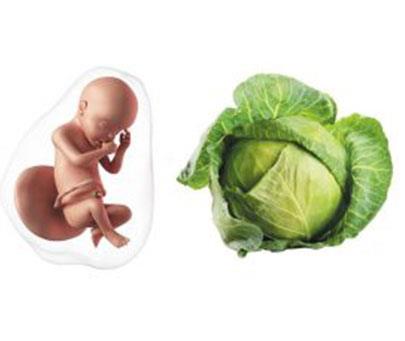
Thirty week
Your belly is changing as the fetus grows. When your baby's head is down, you may notice a change in the shape of your belly. do not be scared. You may also notice stretching in the thirtieth week of pregnancy. If your stomach itches, massage it with a good moisturizer.
Other changes in the mother's body in the 30th week of pregnancy:
- Now you only need 300 calories more per day than before pregnancy
- The food you eat now moves more slowly through the intestines and is better absorbed. This leads to dry stools and constipation.
- During pregnancy, the joints become looser, and the center of gravity changes.
- Bloating occurs due to slow bowel movements. Drinking plenty of water can help relieve bloating.
- Your kidneys work much harder, they have to filter more blood. Your kidneys produce more urine.
- You are more prone to urinary tract infections during pregnancy.
- To book an ultrasound appointment for the third trimester of pregnancy (28 to 30 weeks), contact HopeGene Medical Institute.
Do not worry. The excess weight acts as a reserve for feeding the fetus during lactation. It takes nine months to gain weight and probably just as long to lose weight.
This week, your baby is 39.3 cm tall and weighs 1319 grams
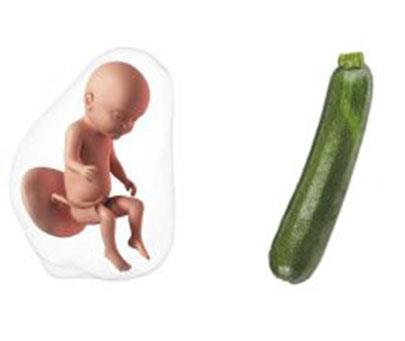
thirty-first week
In the 31st week of pregnancy, your belly has grown so much that you have shortness of breath and you feel that you are out of breath after taking a few steps and you have to sit down and rest. Your uterus is now 11 cm above the navel and compared to the 12th week, the uterus covers the entire space of your abdomen.
This week, the baby is 41.1 cm and weighs 1502 grams.
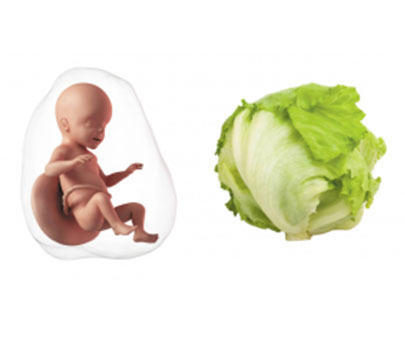
thirty-second week
In the 32nd week of pregnancy, due to the change in the position of the fetus and the bending of its head towards the lower parts of your abdomen, its legs are placed under the ribs, and in this condition, you may feel severe pains under your ribs. The pressure of the uterus will move the rest of your body. At this time, your belly is about 12 cm higher than your body and the length of the uterus is 31 cm. Progesterone slows digestion so your body can absorb more nutrients to pass on to your baby. You may notice your baby kicks more after a meal.
This week, your baby's height is 42.4 cm and his weight is 1702 grams. In this week, your fetus's ability to smell has increased, but due to the lack of air inside the womb, the fetus cannot yet smell anything. Your baby's skin starts to thicken and the baby's bones start to harden, except for the skull bone, which remains soft to keep the baby healthy at birth.
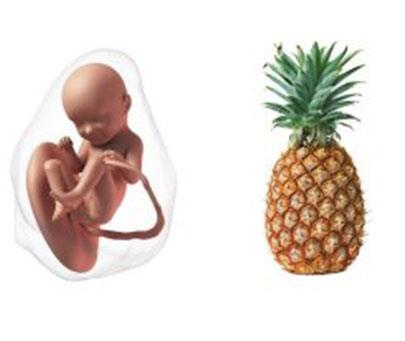
thirty-third week
In the 33rd week of pregnancy, you feel like a balloon that keeps blowing up. Your arms and legs and even your face will continue to increase in volume. You may have to use wrist bands or pregnancy belts, but these swellings will probably stay with you until after delivery. If these swellings increase very suddenly and there is a headache along with blurred vision, inform your doctor immediately. Your uterus has become 500 times normal this week. Amniotic fluid levels are at their lowest so the baby's kicks seem a little sharper! The placenta weighs about 2 pounds. In the 33rd week of pregnancy, you have gained about 10 to 13 kg. If you are pregnant with twins, you gain a total of 14.5 to 19 kg. If your stomach feels crampy from time to time, you probably have Braxton Hicks contractions. Braxton Hicks are not painful and often occur after sex or exercise.
They are different from regular contractions because they stop when you change position. Real contractions continue – these contractions are at least five times an hour and are, on average, real labor pains. Some complications and conditions increase the likelihood of delivery, such as excessive amniotic fluid, dehydration, or being 33 weeks pregnant and having twins. This week, your baby is 43.7 tall and weighs 1918 grams.
Your child is growing a lot. Lung development is important at the end of pregnancy, and your body secretes a substance called surfactant. This detergent-like substance causes the lungs to stop when your child cries. If your child is born prematurely, he will receive artificial surfactant. Although his bones have become hard, the bones of his head are still not attached and are soft. In the 33rd week of pregnancy, she plays with the umbilical cord from time to time.

Thirty-fourth week
In this week (thirty-fourth week of pregnancy), you may feel pain or even numbness in your fingers, wrists, and hands. The tissues of your wrist may swell like any other tissue in your body. In this case, the pressure in the carpal tunnel (which is a bony passage in your wrist) increases. The nerves that pass through this channel are under pressure, which results in complications such as numbness, itching, shooting, burning, shooting, or vague pain. Try using wristbands or place a pillow under your arms while sleeping and keep them above the body level.
The belly at 34 weeks may be a little smaller than a few weeks ago. This is because the baby may have descended into your pelvis. This makes breathing easier because your lungs have more room. Amniotic fluid is at an all-time high between 34 and 36 weeks pregnant, so you may feel like your belly won't get much bigger after this point. This is because the fluid is reduced, so the baby can grow and have enough room to turn around. Continuously measure and check the number of fetal beats. Set a timer and see how long it takes for the fetus to move ten times. Then check each day to make sure the approximate time is the same. Tell your doctor about any significant changes.
This week, your baby is 45 cm tall and weighs 2146 grams.
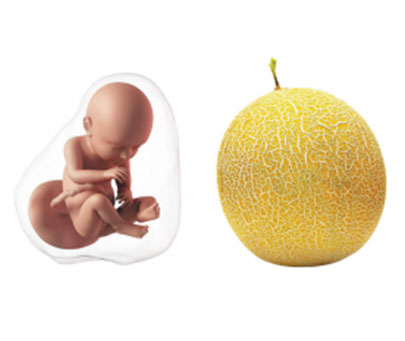
thirty-fifth week
Your monthly visits with the doctor will become weekly at this time and the doctor will check the growth of the fetus. Your internal organs, such as your bladder and lungs, are under pressure from the growing uterus. Bladder capacity is reduced so you cannot control your urine. If the baby's head is down, the frequency of your urination will increase. Exercise strengthens the pelvic muscles and helps control urination. But do not reduce fluids. You should drink a lot of water daily to prevent constipation and swelling. Water helps the fetus absorb nutrients from the blood cells. Unfortunately, heartburn continues until the fetus is transferred to the cervix. The uterus not only puts pressure on the bladder but also puts pressure on the stomach and causes heartburn. The muscles that were preventing food from entering the esophagus are now resting, which is why heartburn occurs. But this problem disappears after childbirth. There are ways to control and treat this problem. Avoid eating foods that cause stomach irritation such as spicy and fatty foods. Caffeine causes acid secretion. Drink water before and after meals, but do not drink water during meals. Wear comfortable clothes and allow your body to breathe. Eat two hours before bedtime to allow the stomach to digest the food. Do not forget the meal because it causes acid secretion and heartburn. The growth of the uterus puts pressure on the intestine and makes it unable to function properly. Iron supplements can solve the problem. Pregnancy hormones cause the muscles around the pelvis to relax. To solve this problem, try to eat foods rich in fiber such as fruits and legumes. Kiwi juice also helps the proper functioning of the digestive system. Warm liquids increase bowel movements.
The growth of the uterus increases the pressure on the vessels of the pelvic area, so the blood flow from the legs to the heart decreases. Veins send fluid to the knees and feet. This causes swelling. Edema is common in the third trimester of pregnancy, especially when the fetus is close to the cervix. The swelling gets worse as the time of delivery approaches. Swelling in pregnancy is not a concern unless the swelling is observed on the face and around the eyes or hands. Contact your doctor immediately to reduce the risk of preeclampsia. Elevate your feet to prevent swelling. Extend the legs and rotate the knees. Wear comfortably. Drink plenty of water. Your legs will return to their normal size after giving birth. At this time, the body has lost excess fluids.
As the fetus and its internal organs grow, the uterus enlarges and lower back pain begins. Gaining weight causes you discomfort and annoyance. Hormonal changes also cause problems. Hormonal changes cause pelvic muscles to relax and prepare for childbirth. These hormonal changes cause relaxation of the muscles around the spinal cord and back pain. Like other pregnancy symptoms. Do not wear high heels and sleep on your back to avoid back pain. If the pain is severe, talk to your doctor to prescribe painkillers. This week, your baby is 46.2 cm tall and weighs 2,383 grams.
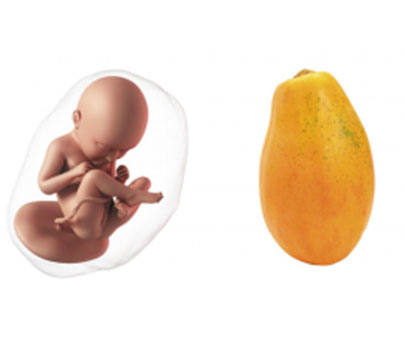
thirty-sixth week
Now is the time when your baby has come down to the pelvis, which increases the pelvic pressure and the urgency of urination. Do not worry if you feel that your baby is falling, this is a normal feeling for most women at 36 weeks of pregnancy, and if there is no contraction, pain or There is no need to worry if it is bleeding. The cervix reaches exactly below the sternum this week. If this is the first time you are pregnant, within a few weeks the baby's head will be inside your uterus. The end of pregnancy is training for pregnancy. Your cervix opens at this time to soften and prepare the environment. Although all of these conditions are signs of pregnancy, there is no need to go to the hospital immediately upon seeing any change. You are probably still a few weeks away from giving birth.
At 36 weeks of pregnancy, the belly probably does not change much. You may have gained 11 to 16 kg, the recommended amount of pregnancy weight gain for women with a normal BMI. This weight gain may make movement difficult. You will probably gain about 200 grams of weight every week from now on. If you are 36 weeks pregnant and you are pregnant with twins, you have probably gained 16 to 20 kg. While most twins are born around 36 weeks, your baby may be born a few weeks later. This week, your baby is 47.4 cm tall and weighs 2,622 grams.
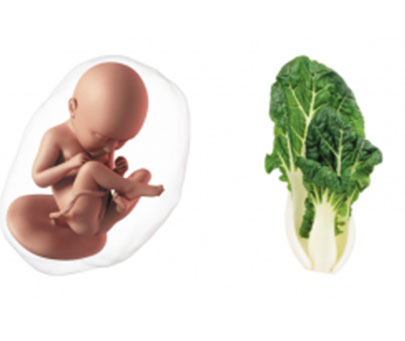
thirty-seventh week
During this period, Braxton Hicks pains or false pains will bother you and you may confuse it with labor pains. These pains appear irregularly. When you can feel that labor pains have arrived, the distance between these pains is short and the duration is long. The cervix is closed by a dense and thick mucus called "mucous plug" during pregnancy, which protects it. This mucus may become bloody at the time of delivery. Therefore, if you see regular pains and blood spots in the 37th week of pregnancy, know that your child is on the way. Orgasm this week can cause contractions because sperm contains prostaglandins and can stimulate the uterus. This week your baby measures 48.6 cm and weighs 2859 grams. Your baby is nearing the end of her weight gain and is ready to be born.
You may feel that your child moves a lot but does not make big movements. Your child is looking for a way to have less resistance to a simple delivery. You can expect his arrival this week. If he is born, he will be considered a full-term baby. It's hard to believe, but he is still growing until the last moments of pregnancy. He is training now. So it is sucking the finger and swallowing the amniotic fluid. In the 37th week of pregnancy, he opens and closes his eyes and practices holding objects with him. However, the most important exercise he does is breathing exercise. He must be able to adapt himself to this world upon entering the new world.
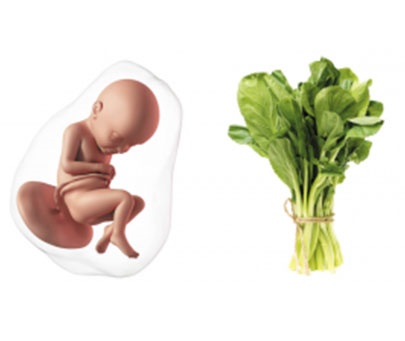
thirty-eighth week
As delivery approaches, you may notice an increase in vaginal discharge. This is very normal and you will not have any problems. If you develop a bad odor or color, or if you experience itching, burning, or fever, seek medical advice. You may be able to breathe more easily as your baby falls into the pelvis. If contractions last more than 30 seconds and occur every 5 minutes, it's time to give birth!
This week, your baby weighs 3083 grams and is 49.8 cm tall.

Thirty-ninth week
The doctor may call you every week and ask you about the symptoms of labor pain. In addition to ultrasound, the doctor examines the cervix to see if the cervix is dilated. Also, if the cervix has softened, its tissue has become similar to the tissue of your cheek. From the second trimester of pregnancy onwards, the muscles of the uterus begin to contract. At first, these contractions are not noticeable, but as the time of delivery approaches, the number of contractions and their intensity increases. Sometimes these contractions are regular and rhythmic and come close to each other in such a way that you think the time of delivery is near. But the main contractions become longer and more intense over time and are accompanied by other signs of labor.
Even if you don't notice other signs of labor, but the contractions increase over time or the fetus becomes strangely still, call your doctor. If the fetus enters the pelvic area, it puts pressure on internal organs such as the bladder and pelvis. In this case, you will feel discomfort in the lower abdomen. Sometimes you experience shooting pain in the pelvic area, which is due to the turning of the fetal head. Emotional stress along with physical pressures in pregnancy makes the mother tired. But if you constantly have this feeling, call your doctor. These changes may be due to anemia or lack of sleep. But in some cases, these changes and fatigue are due to approaching childbirth. This week, your baby's height is 50.7 cm and their weight is 3288 grams.

fortieth week
Congratulations, you are now 40 weeks pregnant. In this part, we will introduce you to the changes of the 40th week of pregnancy. The end of the wait has come and you are approaching the final stages of your pregnancy. Only five percent of children are born at the specified time and a large number before or after. They are born from the time set for delivery. There is nothing to worry about because your baby will be born when he is ready. During this time, you should see your doctor regularly.
The doctor may perform an ultrasound to ensure the health of the fetus. In this ultrasound, the weight, height, and heart rate of the fetus are checked. The doctor makes sure that the amount of water around the fetus is sufficient. If the fetus has not yet entered the pelvic area, it will enter the birth canal this week. So soon your pain will start. You will feel pain in the lower abdomen as the fetus puts pressure on the pelvic area. The fetus puts pressure on the pelvis, vagina, and abdomen. You may also sometimes feel pain in the pelvic area due to the movement of the fetal head.
As the time of delivery approaches, erratic contractions begin to increase. These contractions are irregular and not very intense. But sometimes it becomes difficult to distinguish the difference between these two contractions, and you can only notice the difference through the dilation of the cervix. The doctor asks you to pay attention to the time of these contractions and write the interval between them. The baby's head is positioned so that it can pass through the birth canal. Your uterus gradually prepares for delivery during the 40th week and the next week, and the cervix becomes soft and open. If the pains are repeated for more than a minute and every time for 5 minutes, it is probably time to put your load down. It is better to control the movements of the fetus during these weeks.
If she shakes violently or suddenly calms down, you should call the doctor as soon as possible and prepare for delivery.
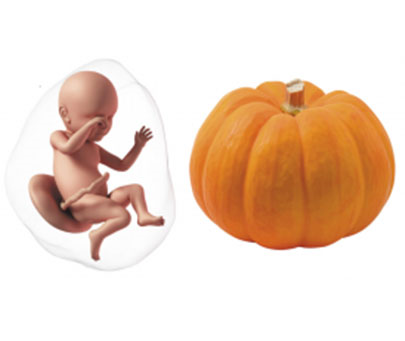
forty-first week
After about 9 months of pregnancy, seeing your baby for the first time will bring you a wonderful and indescribable feeling. If you have reached the 41st week of pregnancy, your baby may want to stay in your womb a little longer. However, by knowing about the final stages of pregnancy, you will be sure that there is nothing to worry about. When the mother reaches the 41st week, that means she spends the last days of her pregnancy. However, it is better to make sure that your child's condition is normal. Be sure to see a doctor this week.

Forty-second week
You may be confused by the fact that the baby is born late, but remember that only 2% of women experience this condition. One of the reasons for this condition is a misdiagnosis of ovulation due to irregular menstrual periods. It happens. Just remember that the time of birth is near: in a week, you will be holding your little one. If you have had a membrane graft and your contractions haven't started yet, the midwife may encourage you to start, first, she will apply an ointment or gel that contains prostaglandins (hormones that make the cervix lubricate). The midwife can also rupture the amniotic sac – this is known as artificial rupture of membranes (ARM) and is usually not recommended unless it is an emergency. Finally, Syntocinon – is a synthetic form of the hormone oxytocin. Your water sac must break before you are given Syntocinon. You inject an intravenous drip, so the hormone can go directly into your bloodstream. This can cause severe contractions, so it must be monitored and may include pain relievers such Use an epidural.
Common symptoms this week:
- Diarrhea: Many women get diarrhea before the start of labor because it is a natural way to empty the bowels to make room for the birth of the baby.
- Muscle cramps: Even if the cramps are not very serious, you should contact your doctor.
- Swelling: You experience a large number of body fluids and such problems cause swelling in the feet and ankles, also known as EDEMA. You can also elevate your leg to prevent fluid accumulation.
- Birth signs: If your water sac breaks, you start bleeding, or you start having contractions, it's almost time to give birth. If you're already a mom, good news: Second (or third, or fourth) babies are usually shorter. And it is easier than the first.
Your baby's weight this week is about 3.7 kg and his height is approximately 51.5 cm. Your baby now looks like a small watermelon.

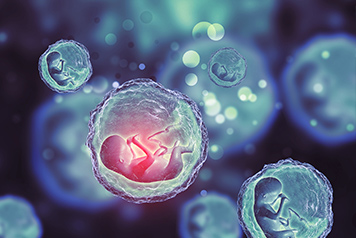
.jpg)
